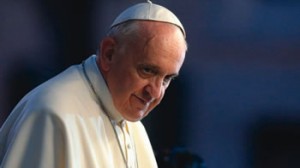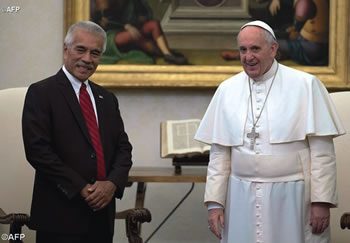Agriculture, Environment and Family
 There is no humanity without cultivation of the land: Francis on the central role of agriculture
There is no humanity without cultivation of the land: Francis on the central role of agriculture
Vatican City, 31 January 2015 (VIS)
“There is no humanity without the cultivation of the land; there is no good life without the food it produces for the men and women of every continent. Agriculture thus demonstrates its central role,” said Pope Francis this morning, as he received in audience two hundred managers from the National Confederation of Direct Cultivators in the Clementine Hall on the seventh anniversary of its foundation.
The name “direct cultivators,” explained the Pontiff, refers to cultivation, “a typically human and fundamental activity. In agricultural work there is, indeed, acceptance of the precious gift of the land that comes from God, but there is also its development through the equally valuable work of men and women, called to respond boldly and creatively to the mandate forever entrusted to mankind, the cultivation and stewardship of the land.”
This task, which requires time and energy, constitutes “a true vocation. It deserves to be recognised and suitably valued as such, also in concrete political and economic decisions. This means eliminating the obstacles that penalise such a valuable activity and that often make it appear unattractive to new generations, even though statistics show an increase in the number of students in schools and institutes of agriculture, which leads us to foresee an increase in the numbers of those employed in the agricultural sector. At the same time, it is necessary to pay due attention to the removal of land from agricultural use, to make it available for apparently more lucrative purposes.”
This reflection on agrarian work led the Holy Father to focus on two critical areas: poverty and hunger, and the protection of the environment. “Vatican Council II reiterated the common destination of earthly goods, but in reality the dominant economic system excludes many people from their correct use. The absolutism of the rules of the market and a throwaway culture in which waste of food has reached unacceptable proportions, along with other factors, have caused poverty and suffering for many families. Therefore, the system of production and distribution of food needs to be fundamentally re-evaluated. As our grandparents taught us, you do not play with food! Bread forms part of the sacredness of human life, and must not therefore be treated as a mere commodity.”
With regard to the second theme, the Pope underlined that in Genesis man is called not only to cultivate the land, but also to take care of it. These two aspects “are closely linked: every agriculturalist is well aware of how difficult it has become to cultivate the land in a time of accelerated climate change and increasingly widespread extreme meteorological events. How can we continue to produce good food for the lives of all when climate stability is at risk, when the air, water and the earth itself lose their purity as a result of pollution? We are truly realising the importance of timely action to safeguard Creation; it is urgent that nations succeed in collaborating for this fundamental purpose. The challenge is to achieve a form of agriculture with a low environmental impact. How can we ensure we safeguard the earth as well as cultivating it? Indeed, only in this way will future generations be able to continue to inhabit and cultivate our earth.”
The Holy Father concluded with an invitation to “rediscover love for the earth as the ‘mother’, as St. Francis would say, from which we come and to which we are constantly called upon to return. And this leads to a proposal: to protect the earth, to make an alliance with her, so that she may continue to be, as God intends, the source of life for the entire human family.”
Defence of the environment central to the Pope’s audience with the president of Kiribati
Vatican City, 5 February 2015 (VIS) –
Today the Holy Father Francis received in audience the president of the Independent and Sovereign Republic of Kiribati, Anote Tong, who subsequently met with Cardinal Secretary of State Pietro Parolin, accompanied by His Excellency Archbishop Paul R. Gallagher, secretary for Relations with States.
During the cordial discussions, emphasis was placed on the importance of the protection of the environment and on matters of climate change, which has worrying negative effects on the country, as in other Pacific States. In this regard, the hope was expressed that on the occasion of the COP-21, to be held in Paris next December, the international Community may adopt concerted and effective measures to face this challenge.
Pope Francis on Family Relationships
General audience: Brother, sister: words beloved to Christianity: Vatican City, 18 February 2015 (VIS)
Continuing his cycle of catechesis dedicated to the family, after reflecting on the figure of the mother and father, the Pope today spoke about fraternity. “‘Brother’ and ‘sister’ are words that Christianity loves. And, thanks to the family, they are words that all cultures and all ages understand.”
Fraternal bonds are very important in the history of the people of God, and are highly praised in the Old Testament.
The bond of fraternity that is formed in the family, among children, if it occurs in a climate of education in openness to others, “is the great school of freedom and peace. Perhaps we are not always aware of this, but it is precisely the family that introduces fraternity into the world,” remarked the Pope, emphasising that from this first experience, fraternity “radiates like a promise to the whole of society and the relations between peoples. And the blessing that God – in Jesus Christ – lavishes upon this bond of fraternity, extends it unimaginably, making it capable of surpassing any difference of nation, culture or even religion.”
He added, “Think about what becomes of the bond between men, even the most diverse, when they are able to say of another, ‘he is just like a brother, she is just like a sister to me’. History has demonstrated sufficiently that even liberty and equality, without fraternity, can be filled with individualism, conformism and personal interest.”
Fraternity in the family shines in a special way “when we see the care, patience, and affection that surround those brothers and sisters who are weak, sick, or disabled. Having a brother or a sister who cares for you is a powerful experience, priceless and irreplaceable. The same applies to the Christian family. We must be moved to tenderness by the smallest, the weakest, the poorest: they have a ‘right’ to capture our heart and soul. Yes, they are our brothers and we must love them and treat them as such. When this happens, when it is as if the poor are part of the family, our Christian fraternity comes to life. Indeed, Christians go towards the poor and the weak not in obedience to an ideological programme, but because the word and example of the Lord tell us that they are our brothers. This is the principle of God’s love and of all justice between men.”
“And now I suggest one thing,” he added, off the cuff: “in silence, each of us, let us think of our brothers and sisters, and pray for them.” St. Peter’s Square remained in silence for a moment.

 Entries(RSS)
Entries(RSS)